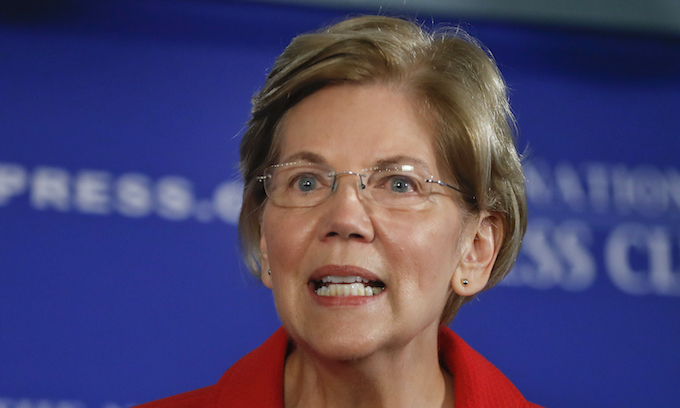Massachusetts’ first openly gay governor. Boston’s first Asian American mayor. The first Black woman AG.
In a season of diversity and historic firsts, isn’t it about time for at least one of the state’s two U.S. Senate seats to be occupied by a person of color?
The person blocking that now is the incumbent, Elizabeth Warren.
The Massachusetts Democrat, who couldn’t even win her own home state in the presidential primary, is now assuring everyone she’s running for a third Senate term in 2024 — despite reports that she’s still eyeing the White House. In a softball interview on public TV, she said she’ll make her formal re-election announcement “sometime soon.”
But the question looms over her candidacy: why should Massachusetts continue to be represented in the Senate by a rich, white woman who once tried to pass herself off as a minority?
Massachusetts voters might be asking themselves the same question. The last elected Black senator in Massachusetts was Republican Ed Brooke, but that was in the 1970’s.
The biggest threat to Warren is not from a Republican challenge, but a Democratic one. Warren would be vulnerable against a popular Democratic candidate, especially one of color. And she did not endear herself to the minority community by endorsing Attorney General Andrea Campbell’s white opponent, Shannon Liss-Riordan, in the 2022 primary.
While Campbell, who just started her first term, would be an unlikely Senate candidate, there are other Democrats who would be formidable opponents.
Michelle Wu was elected two years ago as the first non-white male mayor in Boston’s history, and she has only elevated her stature in state politics since then. Wu could be eyeing the U.S. Senate seat if she ever decides that she doesn’t want protesters hounding her Roslindale house and City Hall office every day.
Wu might even be favored in a matchup against Warren.
Then there’s Deval Patrick, the state’s first Black governor, who has since stayed active in politics, running for president last time around.
Patrick was elected to two terms as governor, and has recently been back in the public eye at the unveiling of the Embrace statue on Boston Common. And we know he’s ambitious by his failed White House bid. He’d have a much better chance at a Senate seat.
The most potentially powerful candidate for U.S. Senate is U.S. Rep. Ayanna Pressley, who ousted a veteran white Democratic incumbent in a primary to win her congressional seat.
Pressley might not want to challenge Warren the same way she disposed of Rep. Michael Capuano but if Warren runs for president again or shows weakness Pressley would be a clear favorite to move up to the Senate.
Other potential Senate candidates are Tanisha Sullivan, head of the Boston NAACP who ran for Secretary of State last year; Michael Curry, the highly respected former NAACP head, and U.S. Attorney Rachael Rollins. All of them would pose a clear threat to Warren.
Warren would be smart to watch her back and forget about her presidential ambitions and concentrate on keeping her seat. She was weakened with her disastrous showing on Super Tuesday, where didn’t finish second in any primary. Massachusetts was the only state where she got more than 20% of the vote but Joe Biden still clobbered her without even campaigning here.
Voters sent her a clear message, one she should heed if she wants to keep her job.
©2023 MediaNews Group, Inc. Visit at bostonherald.com. Distributed by Tribune Content Agency, LLC.
—-
This content is published through a licensing agreement with Acquire Media using its NewsEdge technology.



















“Of color” says it all—that can topple anything.
Whammmen, take a back seat these days, to POCs…
John F. Kennedy Vs Robert F, Kennedy, ” Where Civil-Rights Opponents went off the rails was when they justly demanded Equal rights to unjustly demanded Equal outcome.”
An authenric person as Senator from Massachusetts, how interesting!
What makes you think whatever pops up will be “authentic”??
I’ll be convinced when a native American of color m not a black replaces her, and true justice actually happens. Out with the mold, in with the new.
“Come on man!!” She’s of color…look at her high cheekbones!!!
” Elizabeth Warren Be Toppled By A Democrat Of Color?…”
Elizabeth Warren, An Indian, without Reservation…
Diversity…the downfall of America..“We are five days away from fundamentally transforming the United States of America.” — Barack Obama, October 30, 2008
Me and my mom were chatting about the downfall of our society, and BOTH agreed, it started the moment both POC’s and women got into power.. FEW IF ANY colored senators/governors etc, or women in office, have actually MADE THINGS better.. Most just push liberal ideals.. Even those in the GOP are barely useful…
Here’s an idea Massachusetts voters – elect someone who can get the job done without pandering to every lefty special interest group roaming the shores of Massachusetts Bay! Yeah, vote in a real Republican, not a Baker or Romney.
YOU Assume they can even FIND a real conservative in that state.
I’m a Massachusetts voter. Two points — 1) Please do not even suggest that Ayanna Pressley run for Senate. She is a raving racist lunatic. 2) Sure, a Republican could be elected as a Mass. senator, unless of course he or she proclaims to be pro-life. That just does not fly in Massachusetts and, until the Republican Party acknowledges that fact, then our congressional delegation will remain all Democrats (especially after the Dobbs case).
“unless of course he or she proclaims to be pro-life”
Exactly what human right gives a woman the right to murder her unborn baby?
What about the Baby’s human rights?
A woman’s body ends at the end of the baby’s umbilical cord and that is where the baby’s body begins. It is Not the woman’s body that they are killing;
it is the baby’s body!!
To the Democrat Party cult and their disciples, Gender, Truth, Facts, Reality and History are all irrelevant, if the Democrats do not WANT to believe them or they disagree with them. Democrats will just make up their own, Gender, Truth, Facts, Reality and History to fit what they WANT to believe or fits into the Con or Deception that they are running at the time.
Absolutely not, Liz Warren says she is a Indian and not only that she is a Indian woman that identifies as an American Indian woman…. And that beats a mere African! So she will keep her Marxist Senate seat.
Notice how a true native American (100% Indian) does not even want to get involved in the “other” people lies, false promises, me, me, me agenda. I am an independent voter who finds it very hard to finf a politician that is “for the people”.
She’s about as independent as i am a representative of the might of the Galactic Empire..
Of Color. Can we get a definition of “of color”? Who is without color? Have never seen anyone who had NO color!